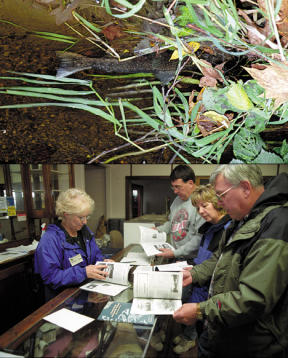There was a time that the salmon ran so thick in Maxwelton Creek that a person could practically walk across the water on their backs.
While this might sound like a pioneer’s exaggeration, it is not, at least according to the official historical record. This week, Whidbey Islanders living in the Maxwelton watershed saw their memories, their grandparents’ memories and the memories of many who came before them turn up in the first book to tell the history of where they live.
“A Journey Through the Maxwelton Watershed,” authored by islander Ann Linnea, comes at the end of six months of research and writing. Sponsored by a grant through the Maxwelton Salmon Adventure, the book tells the story of the watershed from its beginnings underneath the weight of a mile-thick glacier, through its genesis as a salmon breeding area, and to its modern form as a place where humans are still trying to learn to live with nature.
Much of the material in the book comes from interviews with people currently living in the watershed. Standing out is the story of the white settlement development of the area, which got its biggest boost from Scottish brothers David, Peter, Theodore and James Mackie in 1905.
The connections to that family are still strong in the Maxwelton Beach area. Dozens of people stopped by the old Maxwelton Store Monday to pick up copies of the new history book — copies promised free to all residents of the watershed. Bob Miller, a Bailey Road resident whose grandmother was a Mackie and ran the old store, paged through his book with interest. He said he remembers quite a bit about the way Maxwelton used to be.
“There was so much candy in here,” he said, looking around the currently unoccupied Maxwelton Store.
Nancy Waddell, coordinator for the history book project, said the book will go out to 645 watershed land owners. Those working on the history project gave the book a big unveiling Saturday at the old Woodland Hall. The author gave a reading of sections of the book and dozens of people took home their own copies.
The book and several related projects are funded through a $37,000 grant from the Puget Sound Water Quality Action Team. The grant will also pay for school children to create a themed mural and for a visioning process, Waddell said.
The book arrives just as salmon returning to Whidbey Island attempt to make it into Maxwelton and Glendale creeks. Few will make it into the Maxwelton Creek this year, Waddell said, but she said she hopes future salmon runs begin to resemble those in the past.
Those interested in “A Journey Through the Maxwelton Watershed” but who do not live in the watershed may purchase the book at local books stores or through the South Whidbey Historical Society. Watershed residents who were not able to pick up books this week will have their copies hand delivered.



